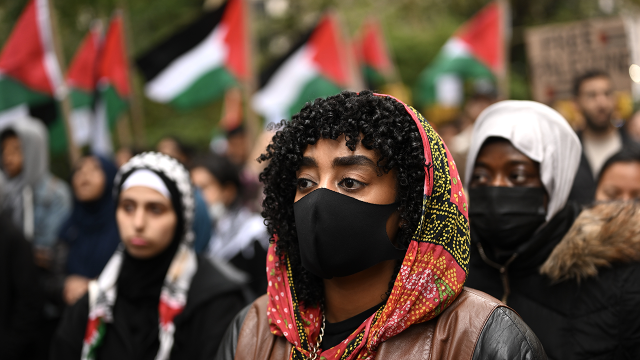
Related: How U.S. Jews are experiencing the Israel-Hamas war
U.S. Muslims are more sympathetic to the Palestinian people than many other Americans are, despite the fact that relatively few Muslims in the United States are Palestinian themselves, according to a Pew Research Center survey conducted in February. And only about a quarter of Muslims in the survey identify as Arab or of Arab ancestry.
Muslim Americans are also highly critical of President Joe Biden’s handling of the war between Israel and Hamas.
Meanwhile, a majority of Muslim Americans (70%) say discrimination against Muslims in our society has increased since the start of the war, and about half (53%) say news about the war makes them feel afraid.
Here’s a closer look at these and other findings from our new survey.
Pew Research Center conducted this survey to explore Americans’ views on the Israel-Hamas war, including what role the United States should play in the conflict. We surveyed a total of 12,693 U.S. adults from Feb. 13 to 25, 2024. Most of the respondents (10,642) are members of Pew Research Center’s American Trends Panel, an online survey panel recruited through national random sampling of residential addresses, which gives nearly all U.S. adults a chance of selection.
The remaining 2,051 respondents are members of three other survey panels – Ipsos’ KnowledgePanel, SSRS’s Opinion Panel, and NORC at the University of Chicago’s AmeriSpeak Panel – who were interviewed because they identify as Jewish or Muslim.
We “oversampled” (i.e., interviewed a disproportionately large number of) Jews and Muslims to provide more reliable estimates of their views on the topics covered in this survey. But these groups are not overrepresented in the national estimates reported here, because we adjusted for the oversampling in the weighting of the data. The survey is weighted to be representative of the U.S. adult population by gender, race, ethnicity, partisan affiliation, education, religious affiliation and other categories. In total, 1,941 Jewish and 414 Muslim respondents participated in this survey.
While the sample design was identical for Jews and Muslims, the resulting sample sizes are different. There are two main reasons for this. The Jewish population in the United States is roughly double the size of the Muslim population. Consequently, national survey panels have roughly twice as many or more Jewish panelists as Muslim ones. In addition, decades of research on survey nonresponse has shown that some groups in the U.S. are more likely to participate in surveys than others. Generally speaking, Jewish adults are more likely to participate in surveys than Muslim adults.
The survey also included questions about where people were born and whether people identify as Arab or of Arab origin. Because of insufficient sample size, we are unable to analyze Arab Americans or Americans of Israeli or Palestinian descent separately.
For more information on how we conducted this survey, refer to the ATP’s Methodology and the Methodology for this analysis. Here are the questions on views and knowledge of the Israel-Hamas war used in this analysis, and on perceptions of discrimination since the war began.
How U.S. Muslims view America’s role in the war
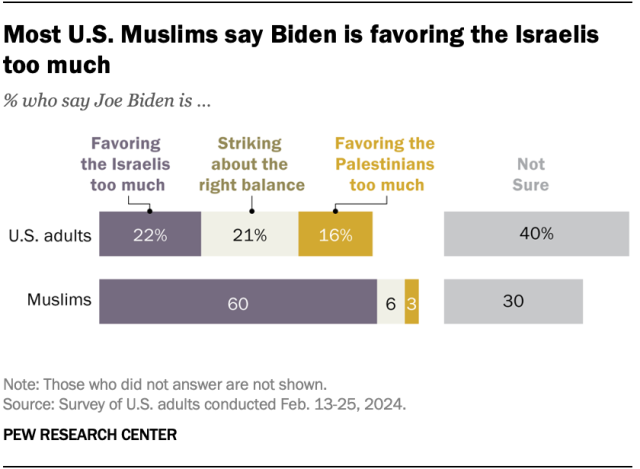
Only 6% of Muslim adults believe that the U.S. is striking the right balance between the Israelis and Palestinians, according to the February survey.
Most Muslims (60%) instead say Biden is favoring the Israelis too much, while just 3% say he is favoring the Palestinians too much. Another 30% are not sure.
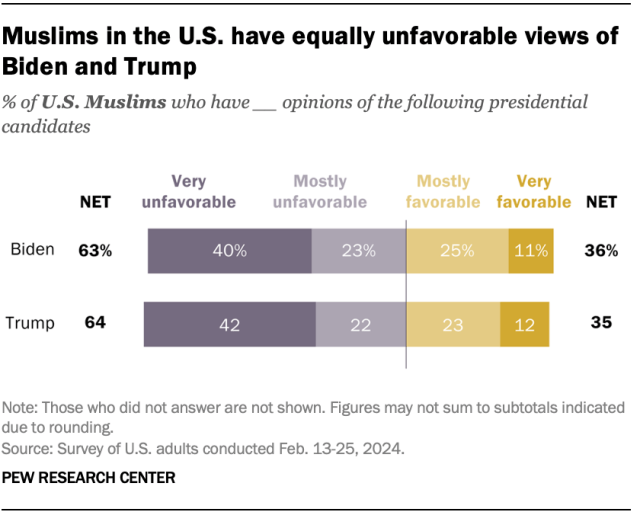
Muslim Americans have been strongly Democratic in the past and remain so – 66% of Muslim registered voters in the survey identify with or lean toward the Democratic Party. (The survey includes 298 Muslim registered voters for an effective sample size of 94 and a margin of error of plus or minus 10.1 points.) But Biden’s handling of the war has led some U.S. Muslims to cast protest votes against him in Democratic primaries this year.
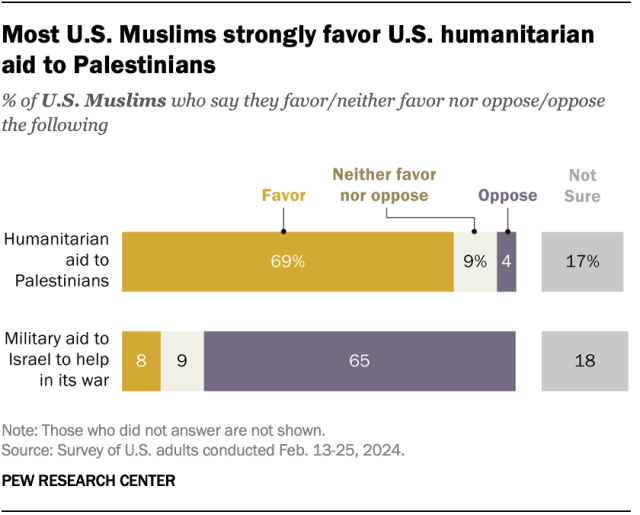
Muslims’ views of Biden are broadly negative, according to our survey: Only 36% view him positively. In fact, Muslims’ views of Biden are broadly similar to their views of former President Donald Trump (35% favorable), despite the fact that most Muslims felt Trump was unfriendly toward Muslims when he was president.
In the current war between Israel and Hamas, 69% of Muslim Americans favor the U.S. providing humanitarian aid to help Palestinian civilians. In contrast, most Muslims (65%) oppose America providing military aid to Israel to help in its war against Hamas.
How U.S. Muslims see the Palestinian, Israeli people and their leaders
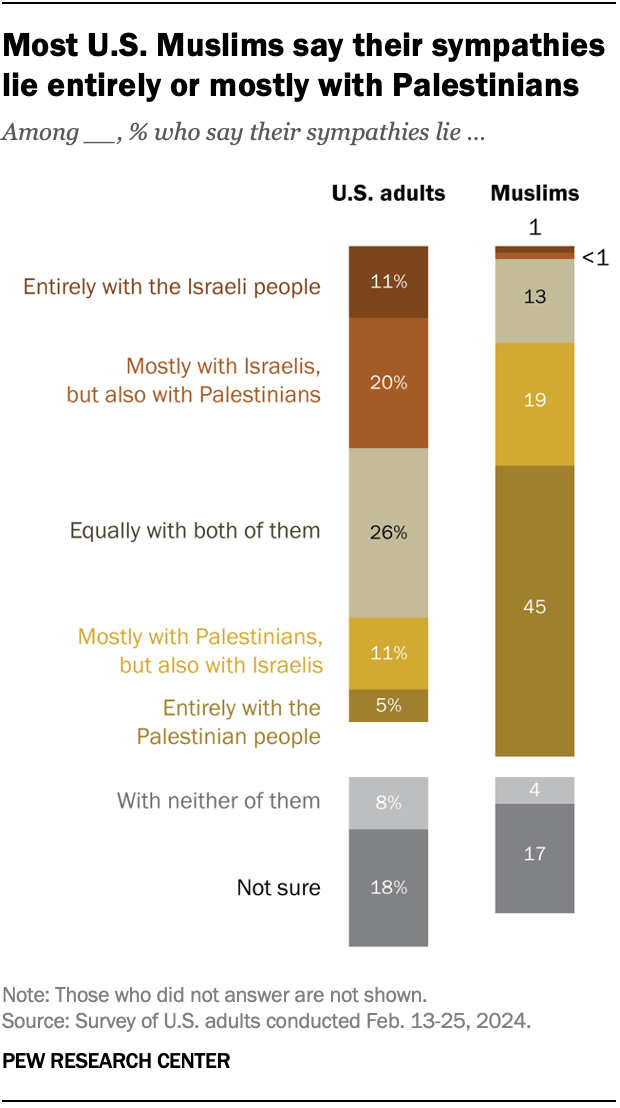
While around a third of Muslim Americans (32%) have some sympathy for both the Israeli people and the Palestinian people, nearly two-thirds (64%) say their sympathies lie either entirely or mostly with the Palestinian people. Among the larger American public, by comparison, relatively few adults (16%) are entirely or mostly sympathetic toward the Palestinian people.
When it comes to the Israeli government, only 10% of U.S. Muslims have a favorable view. In fact, Muslims are more likely to have a favorable view of Hamas (37%), which has controlled Gaza, than of the Israeli government. Still, 58% of Muslims have an unfavorable view of Hamas.
A slight majority of Muslims (59%) have a favorable opinion of the Palestinian Authority, which some experts have suggested may take control of the Gaza Strip if Hamas is removed from power. The Palestinian Authority governs the West Bank and has not had control over the Gaza Strip since Hamas won elections in 2006.
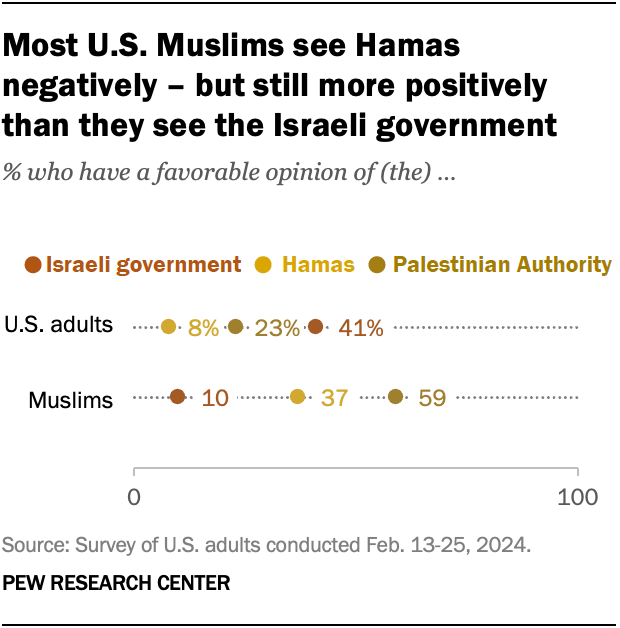
How U.S. Muslims perceive discrimination in the U.S. since the start of the war
Most Muslim Americans (70%) believe discrimination against Muslims in our society has increased since the start of the Israel-Hamas war. A much smaller share of the U.S. public overall (38%) says the same.
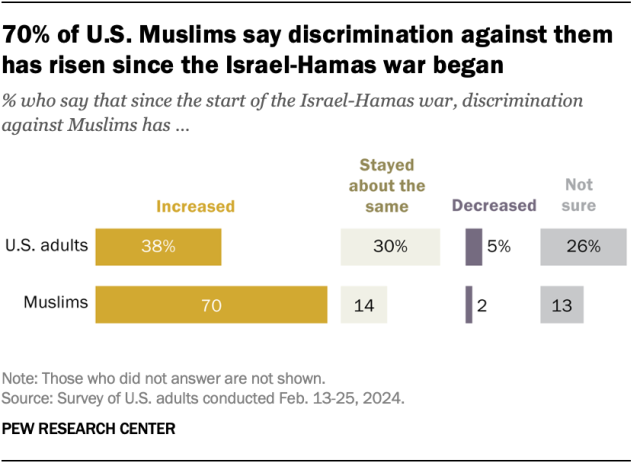
How U.S. Muslims are engaging with and following the war
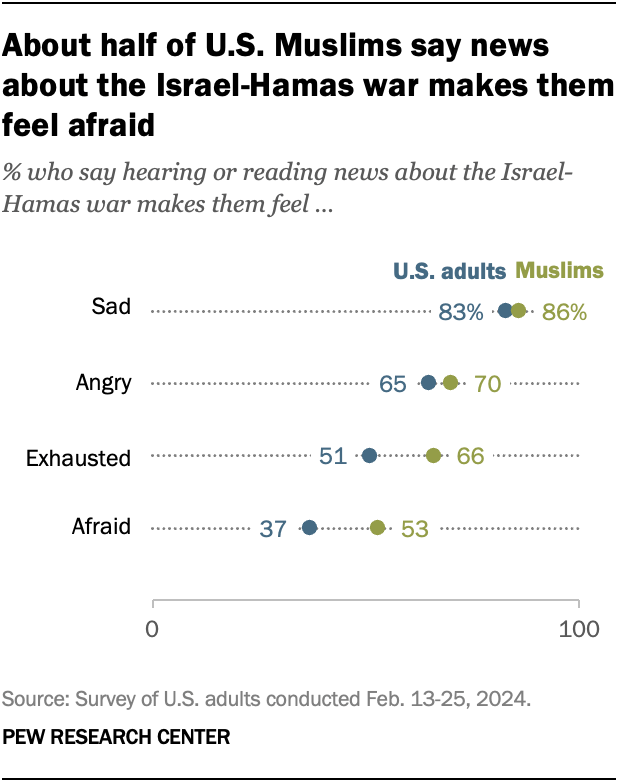
Muslim Americans are more likely than Americans overall to feel afraid when hearing or reading news about the war. Around half of Muslims (53%) say this, compared with 37% of all U.S. adults. Muslim Americans are also more likely than U.S. adults overall to feel exhausted when consuming news about the war.
Around four-in-ten Muslim Americans say they are following the war extremely or very closely, while another 27% are somewhat following it. Still, roughly a third of U.S. Muslims (32%) are not following the war too closely or at all. Jewish Americans, by comparison, are following the war much more closely, according to our survey: 61% say they are following it extremely or very closely and 11% say they are following it not too or not at all closely.
About a third of U.S. Muslims could not correctly identify Benjamin Netanyahu as the current prime minister of Israel. And about three-in-ten Muslims could not correctly identify Hamas as the group behind the Oct. 7 attack against Israel or knew that most of the deaths in the Israel-Hamas war have been among Palestinians and not Israelis. Even so, roughly seven-in-ten correctly answered each question.



